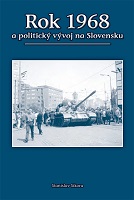Rok 1968 a politický vývoj na Slovensku
1968 and Political Development in Slovakia
Author(s): Stanislav Sikora
Contributor(s): Marta Součková (Editor), Martina Ivanová (Editor), Jozef Hupka (Editor)
Subject(s): History, Political history, Recent History (1900 till today), Special Historiographies:, Post-War period (1950 - 1989), History of Communism
Published by: SAV - Slovenská akadémia vied - Historický ústav SAV
Keywords: Slovakia; Czechoslovakia; 20th century; 1968; politics; political development;
Summary/Abstract: Author’s goal in the presented monograph was to analyze the democratisation process in Czechoslovakia of that era, by taking into acount the development in Slovak part of Republic, which in that time had merely a status of a province. He could, however, not ignore the crutial tendencies, that were inherent in the whole Czechoslovak Republic or within the Soviet bloc, since the development in Slovakia was fundamentally infl uenced by these tendencies. In the presented book author is focusing on political evolution only, since separate publications dealing with the economic and cultural aspects in Slovakia of that period are synchronously prepared by other Slovak historians. The book is divided into fi ve chapters. First of them is dealing with the cautious and moderate liberalization in Slovakia during the so-called „pre-spring“ (1963–1967), since the revival process of 1968 had its evolution and did not came out from nowhere. In 1968, the democratic tendencies, that started some years before, were solely intensifi ed. The second chapter is analyzing the political development in Slovakia and the Czechoslovak Socialist Republic during the fi rst months of 1968, when the promoters of reforms were strenghtening their power possitions and preparing the programme of reforms: the known Action Programme of the Communist Party of Czechoslovakia. A detailed analysis of this documment is an integral part of the second chapter. In the third chapter titled „Reformers and Conservativists“, the author’s ambition was to give an account of the complicated development taking place in the leadership of the Communist Party of Slovakia, which resulted from the polarization between the adherents of reforms on the one hand and their adversaries in the other hand. The reformers understood the necessity of modernisation of the Soviet-type socialism by perceiving and adopting global development trends in the world, especially the so-called third wave (scientifi c-technical revolution). They knew as well, that it is impossible to undertake such a step without democratization of not only the economic, but also the political system. The conservativists, concentrated mostly in the bureaucratic aparate of the Communist Party of Czechoslovakia – the strongest part of the whole socialist political system, were deeply concerned about such a possibility. They were aware, that the democratization tendencies implemented in the economics and politics create a strong pressure on bureaucratic structures of the party-leadership and that their own political existence is strongly questionable by this fact. The fourth chapter is focused on the main question, that is: what is the reason for the fact, that the democratization process (actually processes) in the Czech and the Slovak parts of the Republic were going different ways? Both national communities were pursuing non-identical priorities of this movement, such as the revived civic society in both parts of the state acted differently and followed disparate goals. In order to fi nd an answer this question, the mentioned chapter is based on the analysis of the reasons and concrete symptoms of these differences. In this (and partly also in the fi rst) chapter, the author is paying some attention to the national minorities living in Czechoslovakia – the Hungarian, Ruthenian/Ukrainian, and the Roma-minority, and their perceptions of the reformation process. The fi fth (fi nal) chapter called „The end of reform“ is dealing with the culmination of the democratization process in the Czechoslovak Socialist Republic, with the failed attempt of the consolidation of this process initiated by the leadership of the Communist Party of Czechoslovakia. This chapter speaks also about the brutal attacks on Czechoslovak reform-attempt comming from the Warsaw-Pact states and about the military invasion of „Five“. The mentioned chapter of the book describes the adoption of the Act concerning the „temporary“ stay of Soviet military troops on the territory of Czechoslovakia in the mid-October 1968 – that means the legalization of occupation of the country.
- Print-ISBN-13: 978-80-970060-1-3
- Page Count: 229
- Publication Year: 2008
- Language: Slovak
- eBook-PDF
- Sample-PDF
- Table of Content
- Introduction

